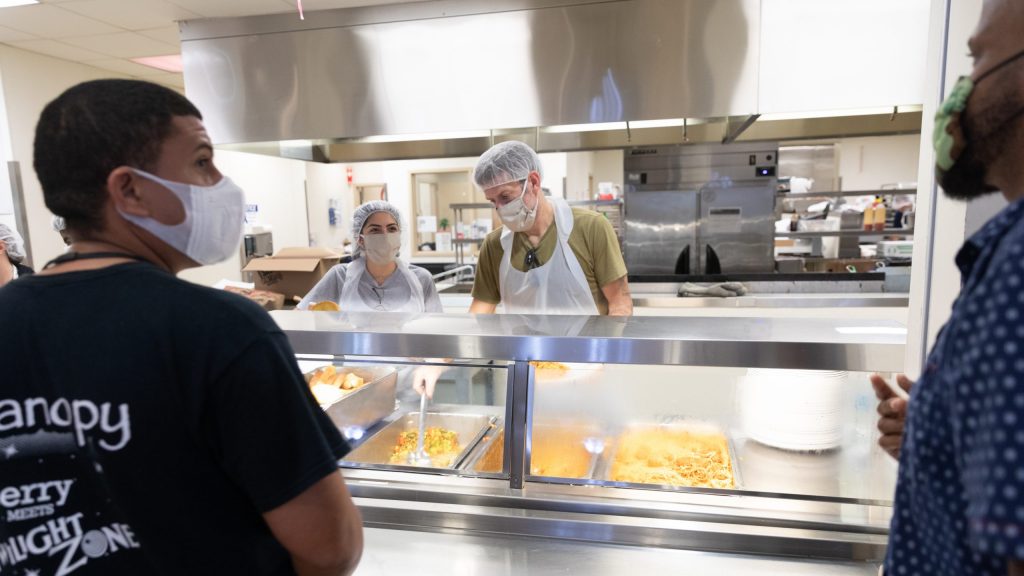Early in the COVID-19 pandemic, the CEO of Camillus House homeless shelter in downtown Miami made a quick stop at a local Dollar Store.
There, Hilda Fernandez bought up all the store's adult coloring books and colored pencils, along with an assortment of would-be bingo prizes.
Those supplies helped keep Camillus' 400-plus residents occupied while socially distancing from the wider community -- just a small part of the toolbox that Fernandez and her staff have been using to keep the residents safe during quarantine.
"We have been at this for quite a while, making sure we had supplies in stock, because we knew it was going to get complicated," Fernandez said, noting the additional costs have run into the hundreds of thousands of dollars.
Six decades after its founding, Camillus House has grown from a small overnight shelter into a full-service center, spread across a series of new buildings and offering a comprehensive system of care for the poor and homeless. Those services include food, clothing, emergency, transitional and permanent housing, physical and mental health care, and substance abuse treatment.
At the main site downtown, the center not only houses 400 residents; it also provides a place where the homeless can get a hot meal, take a shower, pick out new clothes, and receive and send mail. They can also attend classes, like culinary arts training, and consult with on-site counselors and social workers.
But to protect residents and staff from the still-expanding pandemic, the shelter decided early to tightly restrict movement in and out. Staff also began regularly screening residents for the coronavirus, using a tool from the Centers for Disease Control.
Fernandez and her team also drew up an exhaustive list of campus and operational modifications to foster better social distancing and disinfection measures.
The coronavirus has continued to hit South Florida especially hard. As of June 16, cases in Miami-Dade County are continuing to rise, now with some 22,301 positive cases, 3,497 hospitalizations and a total of 847 deaths.
Despite the crisis, Camillus House still accepts people into the program if they comply with a coordinated entry process put in place by the Miami-Dade Homeless Trust and its Homeless Helpline.
"We made a decision from the beginning that we would continue to serve," said Fernandez, who also has worked previously with the Miami-Dade Homeless Trust. "At the end of the day, we believe (the homeless) are going to be safer inside our walls than on the street."
Once accepted into Camillus House, residents get twice-weekly temperature checks and a weekly interview that includes a questionnaire on symptoms. That ongoing screening process takes about two and a half days each week for all 400-plus guests.
The clients also are expected to wear masks at all times, Fernandez said. She added that the masks are replaced on a regular basis.
"That is a little bit of a challenge, but we are very aggressive in enforcing that," Fernandez told the Florida Catholic, newspaper of the Archdiocese of Miami.
If a client appears to show symptoms of the coronavirus, they are sent for testing and temporarily isolated in one of six new quarantine rooms at Camillus House. The rooms are retrofitted with negative pressure and ultraviolet lighting. If testing proves positive, the client is sent to one of the quarantine hotel rooms with the Homeless Trust.
Other safety-related campus modifications at Camillus House include rented hand-washing stations throughout the facility; dining hall seating limited to three persons per table, requiring a longer mealtime schedule; six large ozone cleaners placed in night community areas, including the kitchen and dining hall; and reconfigured dormitory rooms to promote greater social distancing among guests.
Camillus has continued its day center services for the street homeless, including breakfast, the mail room, clothing donations and other services. That program has been significantly modified, however, with new protocols to ensure safety and prevent an outbreak.
All the extra measures are straining the agency's discretionary funds, with more than $210,000 for coronavirus-related expenses to date.
And with residents staying on campus more, they also are eating more meals there: on average about 1,200 a day.
Camillus House also is trying to limit its guests' movement outside the shelter -- they can only leave the property for medical or other priority appointments, so the lockdown has kept them from looking for jobs or searching for an apartment or other permanent housing.
"Our poor clients -- a lot of them were moving forward, trying to move on to the next step ... but no one is really hiring for the kind of jobs our clients can get," Fernandez said. "It doesn't mean we have stopped helping them look for jobs, it's just a little more challenging for them to get one."
Volunteers to Camillus House, too, have been asked to stay away at this time, further straining the meal service operation.
On a bright note, Camillus House successfully applied for the federal Payroll Protection Program, and moved its annual auction fundraiser to an online Zoom platform on May 8, 2020. Another fundraising event is set for December.
Even as Miami-Dade County reopens, Camillus House will likely continue its new safety and social distancing protocols, according to Fernandez.
"We will continue to have measures in place to ensure that we minimize any risk of infection being brought onto our campus," she said.

